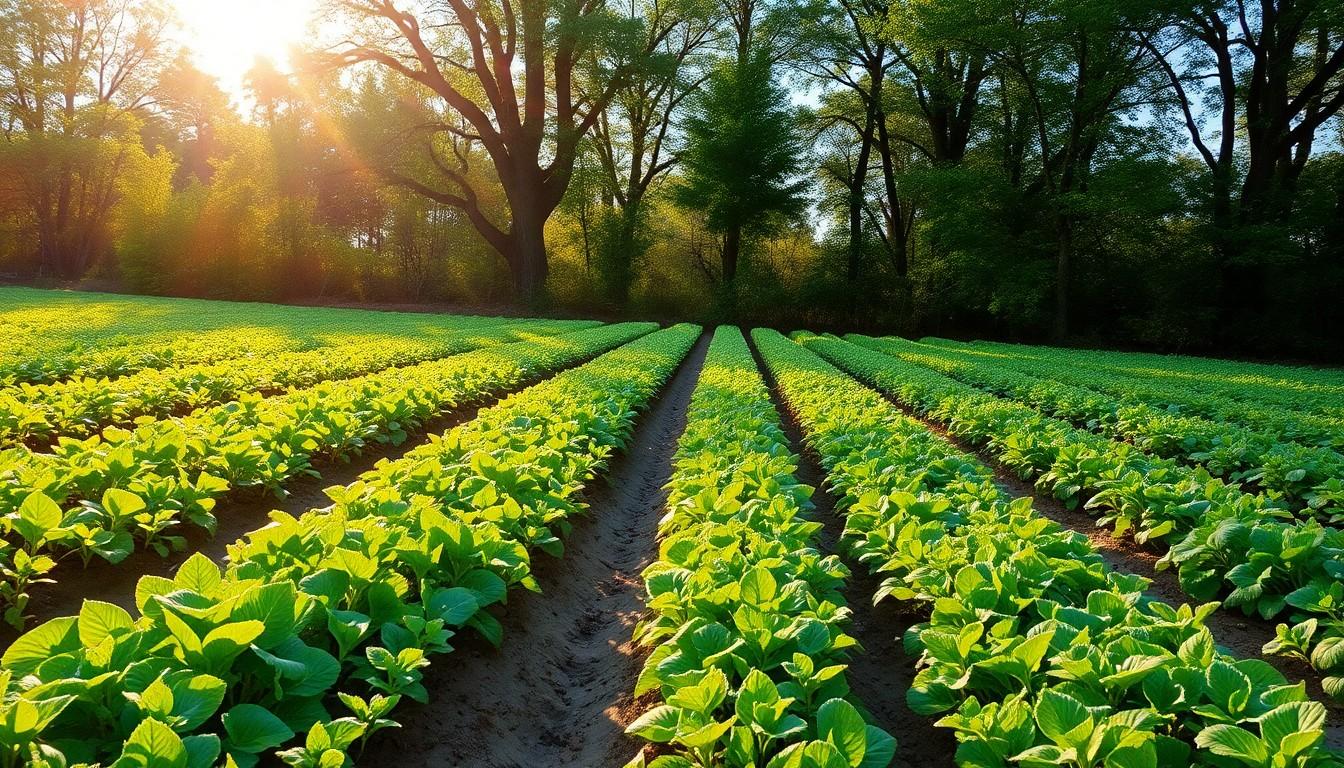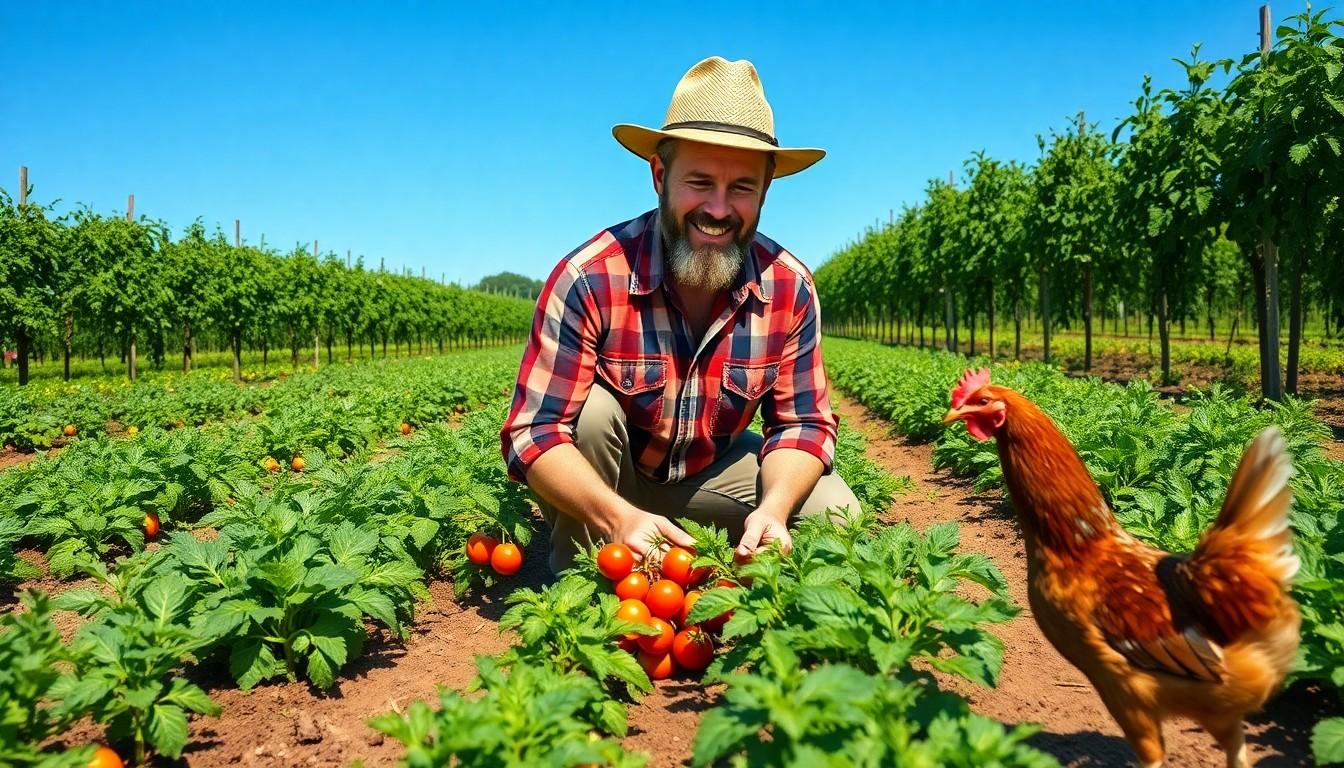Organic farming isn’t just a trend; it’s a revolution that’s sprouting up faster than a weed in a neglected garden. With a growing number of consumers craving fresh, chemical-free produce, the world of agriculture is shifting gears. Farmers are ditching the synthetic fertilizers and pesticides, opting for methods that not only nourish the soil but also the planet.
Facts About Organic Farming
Organic farming involves practices aimed at sustaining healthy ecosystems while producing food. This method rejects synthetic fertilizers and pesticides, opting instead for natural alternatives that promote soil health. Farmers who choose organic methods emphasize biodiversity as a way to enhance resilience against pests and diseases.
The growth of organic farming aligns with increasing consumer demand for fresh, chemical-free produce. Over 5 million acres of farmland in the U.S. are dedicated to organic practices, reflecting a commitment to sustainable agriculture. Organic crops rely on crop rotation, cover cropping, and composting, which improve soil structure and nutrient availability.
Livestock in organic farming systems receive organic feed and access to outdoor spaces, ensuring animal welfare standards are met. As of 2022, organic sales accounted for 6% of total food sales in the U.S., showcasing its appeal and market strength. Certification requirements help maintain standards, ensuring that products meet specific organic criteria.
Organic farming practices can reduce greenhouse gas emissions, contributing positively to climate change mitigation. Soil health in organic systems often enhances carbon sequestration, promoting a more sustainable agricultural future. By supporting local communities through farmers’ markets and cooperatives, organic farming strengthens local economies.
Overall, organic farming represents a holistic approach to agriculture. It preserves environmental quality and enhances food system resilience, catering to a consumer base increasingly focused on health and sustainability.
Benefits of Organic Farming

Organic farming presents numerous advantages, significantly impacting the environment and human health. Sustainable agricultural methods not only enhance food quality but also promote ecological balance.
Environmental Impact
Organic farming reduces chemical pollution by avoiding synthetic pesticides and fertilizers. Soil health improves as natural practices like composting and crop rotation increase nutrient availability. Biodiversity thrives in organic systems, as diverse crops and natural pest controls encourage wildlife habitats. Greenhouse gas emissions decrease with organic methods, contributing to climate change mitigation. Additionally, organic practices enhance carbon sequestration in soils, benefiting atmospheric conditions long-term. These combined factors underscore organic farming’s commitment to environmental sustainability.
Health Benefits
Organic food often contains higher levels of antioxidants compared to conventionally grown produce. Health risks related to pesticide exposure diminish with organic farming, providing safer options for consumers. Organic farming practices foster nutrient-rich soils, resulting in healthier crops. Animal welfare standards improve, with livestock receiving organic feed and more humane treatment. Reduced exposure to synthetic additives further enhances the overall quality of organic products. Consequently, consumers experience enhanced health through the regular consumption of organic foods.
Common Misconceptions About Organic Farming
Organic farming faces several misconceptions that can obscure its benefits. Recognizing these can enhance understanding of its true nature and impact.
Cost Perception
Many people assume organic products cost significantly more than conventional options. In reality, prices vary based on factors like production methods and availability. For instance, organic sales accounted for 6% of total food sales in the U.S. as of 2022, indicating a growing market presence. While some organic items might fall on the higher end, this reflects the investment in sustainable practices rather than inflated pricing. Consumers often support local farmers’ markets, which can provide competitive prices for organic produce.
Yield Comparisons
Misconceptions regarding yield differences between organic and conventional farming persist. Various studies indicate organic farming can yield comparable outputs to conventional methods under optimal conditions. Crop rotation and cover cropping practice help maintain soil fertility, allowing organic farms to produce efficiently. In regions utilizing organic techniques, certain crops show yields equal to or exceeding those of conventional counterparts. Farmers adopting regenerative practices often experience enhanced productivity over time, debunking the myth that organic farming leads to lower yields.
Organic Farming Practices
Organic farming emphasizes practices that promote healthy ecosystems and sustainable food production. Farmers prioritize natural inputs, enhancing soil health and biodiversity.
Soil Health and Fertility
Soil health serves as a foundation for organic farming. Composting enriches soil nutrients while improving structure and moisture retention. Crop rotation enhances fertility by alternating crops to prevent nutrient depletion. Cover cropping protects soil from erosion and suppresses weeds. With over 5 million acres in the U.S. dedicated to organic methods, the impact on soil quality is significant. Organic practices also increase microbial diversity, which contributes to nutrient cycling and improves overall soil vitality.
Pest Management
Pest management in organic farming relies on natural methods. Integrated pest management combines biological controls, cultural practices, and resistant crop varieties to minimize pest impact. Crop rotation disrupts pest cycles, reducing their populations. Beneficial insects, such as ladybugs and lacewings, are introduced to control pest populations naturally. Organic farmers also utilize plant diversity, enabling ecosystems to thrive while naturally regulating pest behavior. Such practices contribute to a healthier environment and minimize reliance on synthetic pesticides.
The Future of Organic Farming
Organic farming trends indicate a promising future as consumer awareness and demand for sustainable practices continue to grow. The increasing focus on health-conscious choices drives more individuals toward organic products. Research consistently shows that organic methods can improve soil health and biodiversity, laying a strong foundation for resilient agricultural systems.
Adoption of technology in organic farming enhances efficiency as more farmers utilize precision agriculture tools. These advancements offer insights that lead to better resource management and higher yields. Integration of data management in farming also facilitates sustainable practices, ensuring that organic methods remain effective and environmentally sound.
As of 2022, organic farming comprises 6% of total food sales in the U.S., reflecting its market presence. Growth potential exists, especially in urban areas where consumers seek fresh produce. Local organic farms increasingly benefit from a direct sales model through farmers’ markets and community-supported agriculture (CSA) programs.
The shift toward regenerative practices enhances organic farming’s appeal. Farmers who adopt regenerative techniques not only sustain their land but also boost productivity over time. Government support and policy frameworks prioritize organic certification, aiding farmers in navigating the complexities of compliance while maintaining high standards.
Sustainability remains a critical focus, with ongoing efforts to reduce greenhouse gas emissions linked to agriculture. Organic farming reinforces carbon sequestration potential, helping combat climate change. Communities support this movement through educational outreach, promoting awareness of environmental benefits tied to organic practices.
Ultimately, organic farming signifies a continued shift towards eco-friendly agriculture, seamlessly blending health, environmental stewardship, and economic viability. As consumer values evolve, the future of organic farming looks increasingly bright.
Vital Movement Reshaping Agriculture
Organic farming is more than just a trend; it’s a vital movement reshaping agriculture. As consumers increasingly seek healthier options, organic practices are proving their worth in promoting environmental sustainability and enhancing food quality. The commitment to natural methods not only benefits soil health but also supports biodiversity and animal welfare.
With the rise of technology and regenerative practices, organic farming is poised for continued growth. This evolution reflects a broader shift towards eco-friendly agriculture that aligns with modern values. As awareness and demand for organic products increase, the future looks bright for sustainable farming, promising a healthier planet and population.

